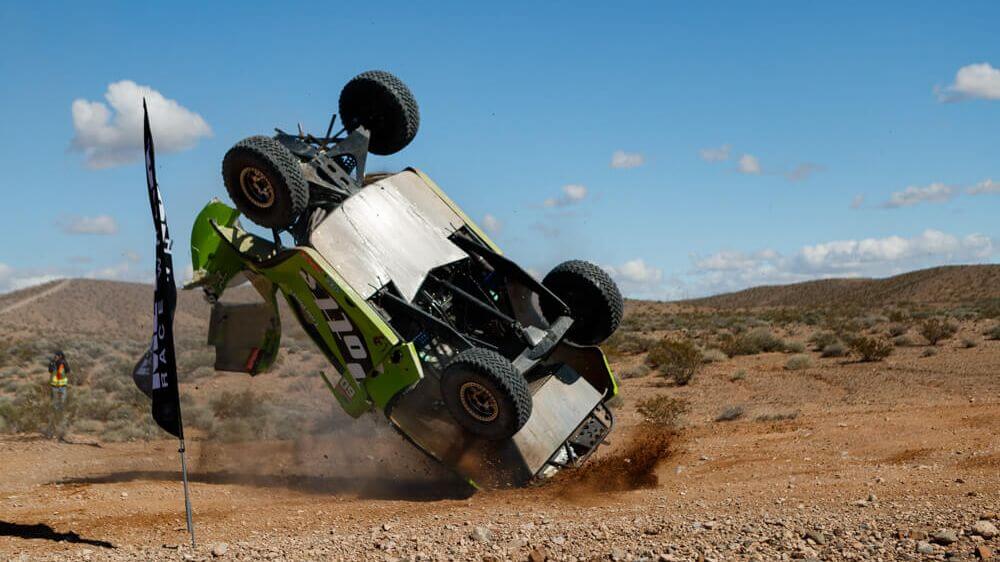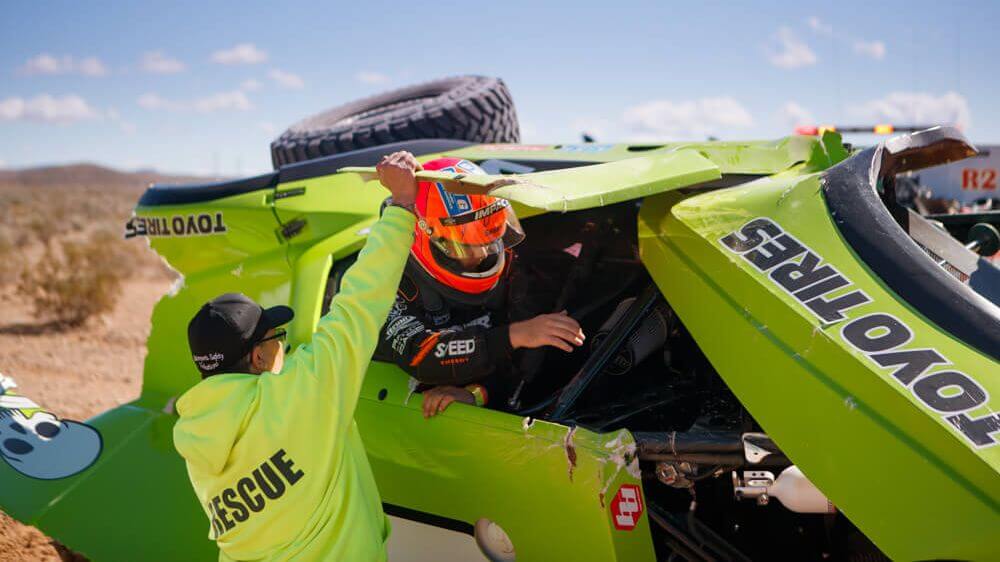The Off-Road Racing Insurance Guide Part 1 - You're a racer, now what?
Mike Larson is a motorsports insurance expert based in Illinois. He’s seen every kind of freak accident and wild claim in our sport, and others, and has helped many of his clients recover from those dark days when things go sideways. We’ve known Mike for years, and he’s helped us with several of our important insurance matters. Recently we named his group Chizmark Larson Insurance the official Motorsports Insurance Group of Off-Road Racer and UTVUnderground and he’ll be attending The Mint 400 and UTV World Championships this year to speak directly to racers and companies who need motorsports coverage. For more information beyond this article, you contact Mike directly via email here.

After talking with Mike at length about the challenges of being an off-road racer and the gap in coverage many have, we decided to produce a series of articles in hopes of informing off-road racers and off-road companies about the risks involved in the sport and how to protect their employees, loved ones and property. This is not legal advice. Do your homework whenever making decisions about things like insurance. But definitely take notes. As usual I will condense all of these articles down to the core takeaways at the top here for those on the go with little time. Keep an eye out for future articles where we dive deeper into each insurance policy type.
TOP FOUR IMPORTANT TAKEAWAYS:
• If you have anything to do with a race team; as a driver, co-driver, mechanic, volunteer, or even sponsor, these articles are going to be extremely useful & informative. Read them, re-read them and share them!
• There are few really important types of coverage you need to understand: Off-Track and Storage, Commercial Auto, Motorsport Racing Owner and Sponsor Liability, Supplemental Participant Accident coverage, and things like whether your personal health insurance covers motorsports.
• Even if you think you have the correct type and amount of insurance coverage - be sure to compare notes and don’t be afraid to call or email Mike Larson directly. There’s a good chance you're missing something and he’s here to help.
• It’s very common to spend 15% of your race budget (including entry fees, travel, lodging, parts) annually on proper insurance coverage to race off-road.
Josh Martelli: So Mike tell us a little bit about you and the family business. You’re a Chicago native and your company Chizmark Larson has been around for a few decades right?
Mike Larson: Yes I am, and yes it has. My grandfather Mike Chizmark started the company in 1949 right after World War II and he ran it until about 1980 at which point my mom got involved. Back then it was primarily home and auto insurance but I joined the company in 2007 and started the motorsports division. I went to 53 races that first year and built that division client by client. We’ve been very successful because we love these sports and really enjoy helping the racers, business owners, and sponsors who are involved. I spent a lot of time at the track as a kid too. You can say it’s in our blood!
Josh Martelli: Yeah talk a little bit more about your philosophy and approach on insurance. Why should someone pick up the phone and call you guys versus searching the internet or calling one of the big carriers?
Mike Larson: Well, listen I’m not going to discourage anyone from doing the research. It’s always good to be informed. But Motorsports in particular is very specialized. Just as racers shop for that specific part they need to give them a competitive edge - well insurance is really the same way. We’re not an insurance underwriter but we know all of them. We go find the best possible policy for our racers and we do it all day every day so we are experts at it. We’re also not in the business of spending your hard earned money for no reason. We’re in the business of protecting you in case things go wrong, and making sure if they do that you are helped by someone who knows who you are.
Josh Martelli: (Laughing) So what your saying is don’t expect Geico and Farmers to know or care about your race program or off-road company?
Mike Larson: Well they might. There are some good agents out there. But one of the big misconceptions we run into a lot is how insurance coverage works when you make the move from being an off-road enthusiast or hobbyist, versus becoming a racer or motorsports company owner. Someone who welds for fun, versus someone who welds roll cages together as a business. THAT is when we need to talk. One you’re getting ready to enter your first race or sell your first part or even off-road service, you need professional motorsports insurance coverage.
Your current auto policy, for example may cover your UTV and 5th wheeler for traveling to Glamis and Ocotillo - but it won’t cover you transporting your racecar to a race. That’s a commercial auto policy all the way.
What happens with a lot of folks is they start out small as privateers, but wake up one day with a dedicated garage full of race parts, tools, and spare motors - and now have a team of volunteers or paid mechanics pitting for them. You have to be really careful with that because a catastrophic loss likely won’t be covered by a homeowners policy. That’s where an Off-Track and Storage policy comes into play.
Josh Martelli: Right so let’s say I have a fire or break-in at the shop or trailer, where I store my racecar and tools at. What’s going to cover that? Is that an Off-Track and Storage policy?
Mike Larson: Yes. It’s very common for people to set up a dedicated LLC business entity for their race teams, and obviously that’s true of any real off-road business. So you’d want to have an Off-Track and Storage policy like any company if you’re racing, to protect your investment. But if you don’t have Off-Track and Storage coverage I would be concerned. That’s where it gets dicey and you need the right protection or you risk getting your claim denied. Meaning if the garage burns down or your trailer gets broken into, it might not be covered at all.
What I’ve found is that there are a few areas most people don’t know about or think about when it comes to motorsports insurance. I’ll give you two examples. One is Motorsport Racing Owner and Sponsor Liability insurance and another is Supplemental Participant Accident coverage. Owner and Sponsor coverage protects you in the unlikely event someone sues you for what happens on the course/ racetrack. Now you might say “Yeah but Mike everyone racing signs a waiver so they can’t sue each other right?” That’s not necessarily the case. When people get hurt and lawyers get involved there’s really nothing legally preventing them from naming you, the promoter, or any sponsor on the side of your car in a lawsuit. They may not win, because of the waiver. But YOU may need to spend the money to hire a lawyer and defend yourself. And as we all know that can quickly add up.
Josh Martelli: Right, yeah I see that. It’s probably not super common but I’m guessing it does happen.
Mike Larson: Oh it does. It does for sure. Same goes with your health insurance. Most folks think they are covered on the track no matter what they are doing. That might not be the case. Some health insurance companies will not provide coverage if you get hurt on the course or track. In fact, we’ve found around 50% of the healthcare providers will not cover a claim on the course or track. So again, what should you do when you take that UTV of yours and go racing? You need to carefully review your personal health insurance policy or call your agent, and you may need to pick up supplemental Participant Accident coverage. Which is just a fancy way of saying “extra medical coverage” for when you’re racing. It’s just like picking up an auto policy for when you go to Mexico. Same concept.

Josh Martelli: Yeah I mean basically what we’re saying is you have life insurance, homeowners insurance, health insurance and car insurance. If you're a business you have liability insurance, and workman's comp insurance - maybe even Errors and Omission insurance. BUT - when you go racing and start putting tens or even hundreds of thousands of dollars into your race program you really need things like Off-Track and Storage, Commercial Auto, Commercial General Liability, and Owners and Sponsors coverage to round out that portfolio of protection.
Mike Larson: That's it exactly. Motorsports is a unique activity. It has unique risks. Your homeowners and personal auto policies do not cover this unique activity. They cover you driving to get groceries and normal homeowner scenarios like storm damage.
Josh Martelli: So is all this super expensive? Are we talking thousands and thousands of dollars per year to get properly covered?
Mike Larson: Not when you consider what’s at stake. On average race teams competing in 4-6 desert races a year will pay about 15% of their budget in properly insuring their program. Meaning if you’re spending $60K to race per year you might pay $9K to properly insure your equipment and staff. Now you might say “Mike that’s crazy expensive…!” And I would ask - how much is your equipment and race program worth? $250K? $500K? $1Mil? If that nine grand affords you a million dollars worth of insurance protection in a risky sport like desert racing that might actually not be expensive at all. What’s expensive is paying to defend yourself in a lawsuit because you hit a guy in the pit with your quad or golf cart and they got seriously hurt. Or paying for damage to a car you hit with your trailer driving to a race, because your personal auto insurance company found out you were towing a race car to a race and denied your claim.

Josh Martelli: Right - it’s like “Hey we wear helmets, fire suits, seat belts, and all kinds of gear in the unlikely event we get hurt”. Why wouldn’t we apply that thinking to our race teams?
Mike Larson: Right exactly. Now listen, insurance companies get a bad rap sometimes and sometimes they deserve it. They overcharge or over insure folks. Or you file a claim and they are slow to pay or they dispute it. That’s where we come in. We’re here to make sure you’re not paying a dime more than you should and if something goes wrong you have us here to help you get your claim pushed through. But step one is really analyzing what you have or do not have. You have to itemize your cars, tools, parts, and other accessories and do it in a way that makes filing a claim on any of it bullet proof. It’s very tough to file a claim if you don’t have receipts, photos, or some kind of supporting documentation for what it is you own and are insuring. So I recommend folks create a spreadsheet and take photos or shoot video regularly of their shops and really capture all of that.
Josh Martelli: Hey that sounds like an entire article just on it’s own! Let’s add that to the list.
Mike Larson: We should! Let’s do it.
Josh Martelli: OK listen that’s enough for now. Let’s reiterate some of the takeaways here and then to your last point, in the next article let’s lay out what people need to know and have ready to share with you or any of your team when they call to get quotes on coverage. Let’s help them cut to the chase and get ready for that call. Sound good?
Mike Larson: That’s perfect. OK wonderful.
THE RECAP:
• If you own or are involved with a race team, as a mechanic, racer, co-driver or even sponsor, you need to be absolutely certain you have the correct insurance coverage in place to protect you.
• Most race teams form a dedicated company, Inc. or LLC to protect their personal assets. These companies often purchase specialized motorsports insurance coverage for the race team.
• The types of coverage you need to understand are: Off-Track and Storage, Commercial Auto, Commercial General Liability, and Motorsport Racing Owners and Sponsors Liability, and Supplemental Participant Accident Coverage.
• It’s very common to spend 15% of your race budget (including entry fees, travel, lodging, parts) annually on proper insurance coverage to race off-road. That annual cost is designed to protect your equipment in case of a loss, and to protect you from lawsuits that may arise from your race program.
NEXT TIME:
What you need to know and have ready to share with an insurance professional to be properly quoted to cover your race program. The basics, and some helpful hints on managing your assets.
We’re going to unpack this entire insurance thing one piece at a time. Mike is going to walk us through all the different types of coverage and hopefully by the end of this season we’ll all be experts. Stick with us. This might be the most valuable collection of articles you read all year.
Follow me: facebook.com/joshuafmartelli
